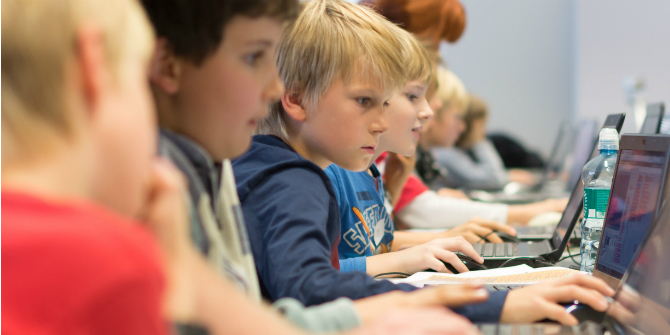 Today marks the last day of the week of Hour of Code, an international programme to give children and young people a brief taste of the basics of coding. Alicia Blum-Ross draws on the Parenting for a Digital Future research project and discusses education technologies, their impact on learning and the thin evidence of outcomes. Alicia is a researcher at the LSE’s Department of Media and Communications. She is interested in youth media production and is part of the Parenting for a Digital Future research project.
Today marks the last day of the week of Hour of Code, an international programme to give children and young people a brief taste of the basics of coding. Alicia Blum-Ross draws on the Parenting for a Digital Future research project and discusses education technologies, their impact on learning and the thin evidence of outcomes. Alicia is a researcher at the LSE’s Department of Media and Communications. She is interested in youth media production and is part of the Parenting for a Digital Future research project.
From schools to youth centres to the White House, the Hour of Code has been highly successful – the staggering 160 million+ participants on the initiative’s website is testimony to this. Those taking part are offered an array of tutorials ranging from basic cause-and-effect puzzles (that can be completed on many types of devices or even on paper) to Javascript and beyond. Many of these tutorials are developed with commercial providers like Google and Facebook (or brands like Star Wars or Angry Birds), or submitted by educational groups like Khan Academy.
As might be expected, technology companies used to selling products in the marketplace are good at also ‘selling’ educational experiences. Like other EdTech initiatives (e.g. Make Things, Do Stuff in the UK), the Hour of Code is a catchy and appealing PR campaign. Through careful marketing and partnerships coding has come to be seen as an essential skill, one that will help children understand the underlying structures of the digital world, gain confidence in accessing or manipulating these structures, and thus potentially be able to ‘compete’ academically or in the future world of employment. However, while he doesn’t disagree that such programmes have value, Ben Williamson has nonetheless argued that ‘learning to code’ as a preeminent educational concern has a particular history, in part wrapped up with corporate advocacy, that should be considered.
Thinking back to the introduction of computers to the mass market in the UK, our colleague Leslie Haddon has described how what was once a ‘blank slate’ came to be inscribed with a host of meanings. As early as 1982 the British government designed an ‘Information Technology Year’ with the slogan ‘there is no future without IT.’ Sounds familiar, right? Great claims were made about technology offering, as Neil Selwyn wrote, a bulwark against ‘economic decline and permanently high levels of unemployment.’ According to Selwyn, the ‘naturalization’ of computers as educational technologies was not entirely natural, but was in large part a product of concerted industry campaigning.
The discourse of computers as educational devices lives into the present, despite periodic debates about whether EdTech lives up to the hype. I have conducted interviews with UK parents living well below the poverty line who have nonetheless prioritized buying a computer (or a tablet, which of course has different affordances) for their children as their way of contributing to their education, even if often for reasons of their own digital literacy or time limitations they can’t support its use. Whereas computers are physical artifacts present in all sorts of workplaces (and frequently used by parents themselves in personal or professional contexts across socio-economic divides), coding is a more complex way of talking about computational languages – what makes computers or programmes run.
Despite this abstraction, many parents are getting on board with ‘learning to code’ – whether or not they really understand what that means. One father we interviewed described coding as the ‘Latin of our time.’ This is a provocative comparison since Latin is also a textual language rather than a spoken or communicative one, was once considered an essential ‘building block’ rather than an end in itself, and for much of recent history has been a language only really learned by elite students.
However, elite parents aren’t the only ones who value coding, though code clubs are often populated by more middle-class students. I recently conducted several weeks of fieldwork in a coding club in a UK primary school with twice the national average of students on free school meals – an indicator of poverty in the UK. I interviewed the parents of participants including Samantha, the mother of Braydon, a 9-year-old British/Caribbean/African boy living in state-subsidized housing. She described what she hoped her son would get out of the club:
He has always said that he wants a job working with computers. So I said, well maybe this might help you. You know, I said, you’re going to secondary school soon… it would be helpful if you knew exactly how computers worked, just for his own knowledge really, you know, just an interest.
Braydon already loved playing video games, so coding felt, to Samantha, as a way of channelling that interest into something he could benefit from. Partly because of the club, Braydon had started to develop an interest in games design. Samantha was pragmatic and told me ‘if he wants to work for Sony he’s going to have to be, you know, the sort of person that Sony wants to hire.’ By this she meant someone who could problem-solve, be a creative thinker, iterate and more (though she didn’t use these terms). All, in addition to employability, what the makers of Scratch (the coding programme Braydon was using), hope for as well. Yet this quote is also poignant since Samantha encouraged Braydon’s interests, but did not engage with the serious potential obstacles that Braydon may likely face in getting a job as a games designer. Equally poignant was Samantha’s acknowledgement that she’d never actually seen any of Braydon’s Scratch designs, since the school does not permit the students to use the public-facing galleries on the Scratch website, and Samantha did not have the time or ability to initiate using Scratch at home to see how the programme worked for herself.
This family, then, exemplifies both the promise and the hidden limitation of initiatives like the Hour of Code. Yes, learning to code is valuable and valued, it is fun and seems productive (though everyone still seems a little vague on why), but it can’t address deeper structural issues endemic to the tech industries. More detailed and longitudinal research is needed to provide evidence of whether such brief encounters with coding really do impact on learning in the here-and-now, or help expand possibilities in the future. In the meantime, parents whose children participate in the Hour of Code or other coding initiatives need evidence of the more affective outcomes around creativity or problem-solving, and, on a more basic level, the chance to understand and appreciate their children’s creations






